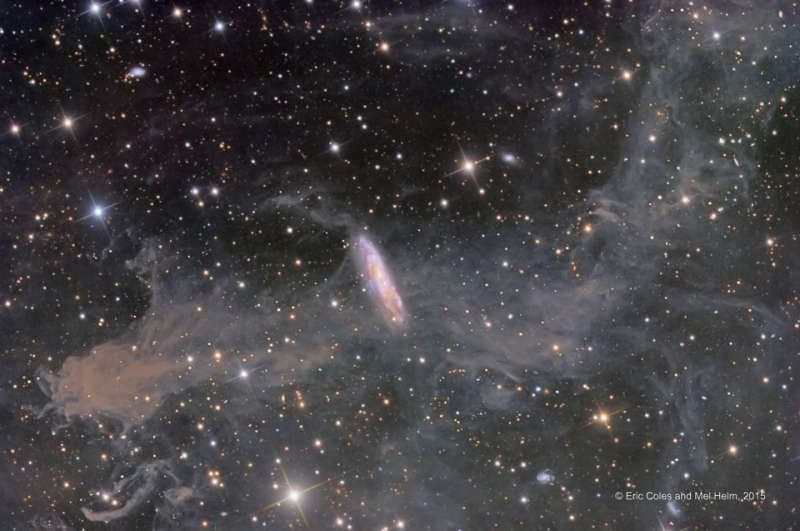Credit & Copyright: Eric Coles and Mel Helm
Explanation:
Is this galaxy trapped in a web of dust?
No -- it is far in the background.
However, spiky stars and spooky shapes are abound in
this deep cosmic skyscape.
Its well-composed field of view covers
about a Full Moon on the
sky toward the constellation Pegasus.
Of course the brighter stars show
diffraction spikes, the commonly
seen effect of internal
supports
in reflecting telescopes, and lie
well within our own
Milky Way galaxy.
The faint but pervasive clouds of interstellar dust
ride above the galactic plane and dimly reflect the
Milky Way's
combined starlight.
Known as high latitude cirrus or integrated flux nebulae they are
associated with molecular clouds.
In this case, the diffuse cloud cataloged as
MBM 54,
less than a thousand light-years distant, fills the scene.
The galaxy seemingly tangled in the dust is the striking spiral galaxy NGC 7497
some 60 million light-years away.
Seen almost edge-on
near the center of the field,
NGC 7497's own spiral arms and dust lanes echo the colors of the
Milky Way's stars and dust.
Astrophysicists:
Browse 1,100+ codes in the Astrophysics Source Code Library
1999 2000 2001 2002 2003 2004 2005 2006 2007 2008 2009 2010 2011 2012 2013 2014 2015 2016 2017 2018 2019 2020 2021 2022 2023 2024 2025 2026 |
Yanvar' Fevral' Mart Aprel' Mai Iyun' Iyul' Avgust Sentyabr' Oktyabr' Noyabr' Dekabr' |
NASA Web Site Statements, Warnings, and Disclaimers
NASA Official: Jay Norris. Specific rights apply.
A service of: LHEA at NASA / GSFC
& Michigan Tech. U.
|
Publikacii s klyuchevymi slovami:
spiral galaxy
Publikacii so slovami: spiral galaxy | |
Sm. takzhe:
Vse publikacii na tu zhe temu >> | |
